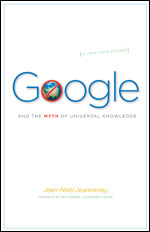Review: Jeanneney, Google and the Myth of Universal Knowledge

The Google Print Library Project is the latest of Google’s efforts to digitally copy and distribute the holdings of several of the world’s largest libraries—a project which has incited controversy among both the book industry and academe alike. Google presented this digital repository as a first step towards a long-dreamed-of universal library, but skeptics were quick to raise a number of concerns about the potential for copyright infringement and unanticipated effects on the business of research and publishing. Google is being sued by Association of American Publishers for copyright infringement.
Jean Jeanneney’s new book Google and the Myth of Universal Knowledge exposes the controversy surrounding this important issue and articulates some of the most powerful arguments why Google’s Library Project might spell bad news for those concerned about the world’s literary and cultural heritage. A review in the October edition of the ALA Booklist gives an intelligent summary of Jeanneney’s argument:
From Europe’s point of view, Google’s proposal to digitize the content’s of America’s leading libraries raises questions beyond the copyright issues that presently beleaguer the project. This brief salvo from the president of France’s Bibliothèque Nationale challenges directly Google’s assertion that its venture offers a source of universal knowledge. Jeanneney finds such claims spurious and utopian. For by the very nature of the library collections that Google proposes to put online, American and British works would dominate, leaving behind that portion of the world’s hundred million books not in English. Moreover the character of digital search engines necessarily ranks results according to algorithms that reflect prejudices that lack universal validity.… Google’s commercial status also troubles Jeanneney, for the commoditization of information by a single corporation inevitably subjects it to sale and to control by a less benign owner.
As a leading librarian, Jeanneney remains enthusiastic about the archival potential of the Web. But he argues that the short-term thinking characterized by Google’s digital repository must be countered by long-term planning on the part of cultural and governmental institutions worldwide—a serious effort to create a truly comprehensive library, one based on the politics of inclusion and multiculturalism.